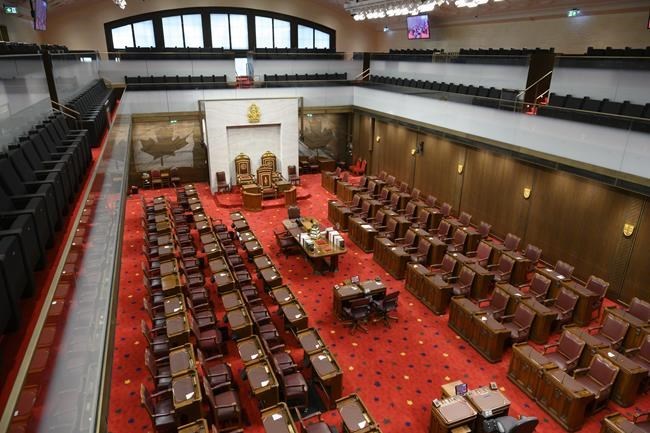OTTAWA — Senators want the federal government to collect race-based data on who requests and receives medical assistance in dying in Canada.
They approved Thursday an amendment to Bill C-7 requiring the government to collect such data.
The bill would expand access to assisted dying to intolerably suffering individuals who are not near the natural end of their lives.
The amendment reflects concern that Black, racialized and Indigenous people with disabilities, already marginalized and facing systemic discrimination in the health system, could be induced to end their lives prematurely due to poverty and lack of support services.
Sen. Mobina Jaffer, a member of the Independent Senators Group who proposed the amendment, noted that no race-based analysis was done when the bill was being drafted.
"One in four people have been left out of the data collection," she told the Senate.
Her amendment was widely supported and passed on a voice vote with no objections, other than the government's representative in the Senate, Sen. Marc Gold, saying that he wanted to abstain.
Sen. Kim Pate, another member of the Independent Senators Group, said the amendment won't ensure that no one opts for an assisted death as a result of unequal access to health care, housing and social and income supports.
But she said it will ensure that "the government must at least provide some answers about who makes use of Bill C-7 and under what circumstances."
Pate said the government should also be required to provide more information on who accesses assisted dying, including income, whether they are institutionalized and whether they had access to alternative means of relieving their suffering and to social and financial supports.
Such information could have been provided had a legally mandated parliamentary review of the five-year-old assisted dying law begun in June as it was supposed to. Numerous senators expressed frustration that they're being asked to revamp the law before the promised review has even begun.
Justice Minister David Lametti has blamed the COVID-19 pandemic for disrupting plans for the review but, while he's said he hopes it can begin soon, he's been unable to promise a specific start time.
Senators took matters into their own hands Thursday, approving another amendment requiring that a joint parliamentary committee be struck within 30 days of the bill receiving royal assent to conduct a comprehensive review of Canada's assisted dying regime. The committee would report back by Sept. 15 or, if Parliament is prorogued or dissolved for an election before then, within 180 days of the committee being re-established.
"Passing C-7 with a hope and a wish or even a promise that the review will happen seems to me to be a poor bet," said Sen. Scott Tannas, leader of the Canadian Senators Group who proposed the amendment.
"We need to be clear, in writing, in the bill."
Senators rejected Thursday, by a vote of 63-12, with three abstentions, another amendment that would have made it a criminal offence to compel anyone to provide or "facilitate" an assisted death.
Conservative Senate leader Don Plett proposed the amendment in a bid to ensure that medical practitioners who have moral objections to assisted dying are not required to refer a patient who requests an assisted death to another practitioner who will help them — as is required in some provinces.
But Gold and other senators argued that such an amendment would likely be an unconstitutional use of the federal criminal law power to invade provincial jurisdiction over the regulation of health services.
Thursday's debate wrapped up the time allotted for amendments to be proposed. However, debate on one amendment, proposed by Sen. Marilou McPhedran of the Independent Senators Groups, was cut short after Gold asked the Speaker to rule it out of order.
Debate and vote on that amendment could still occur next week if it is ruled in order.
McPhedran proposed to delete all provisions in the bill that would allow assisted dying for people who are not nearing the natural end of life. She argued that such provisions single out people with disabilities and send the message that having a disability is "a fate worse than death."
However, Gold argued that McPhedran's amendment is directly contrary to the objective of Bill C-7, which is intended to bring the law into compliance with a 2019 Quebec Superior Court ruling.
That ruling struck down a provision in the law that allows assisted dying only for individuals whose natural death is reasonably foreseeable.
After the ruling on McPhedran's amendment, the Senate will begin final debate Tuesday on the bill, as amended by senators, with a final vote to take place by the end of the day Wednesday.
The schedule is intended to give the government time to meet the thrice-extended court-imposed deadline of Feb. 26.
Earlier this week, senators approved several substantial amendments to the bill, including one that would allow people who fear losing mental capacity to make advance requests for assisted death and another that would impose an 18-month time limit on the bill's proposed ban on assisted dying for people suffering solely from mental illnesses.
If senators approve an amended bill next week, it will have to go back to the House of Commons to decide whether to accept or reject the changes and then back to the Senate to decide whether to accept the Commons' verdict.
This report by The Canadian Press was first published Feb. 11, 2021.
Joan Bryden, The Canadian Press



